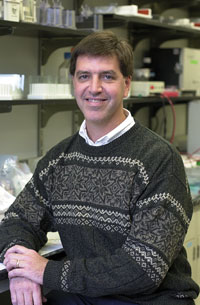
Dr. Stephen Strittmatter |
work on brain disorders
Neurologist Dr. Stephen Strittmatter has received an award of $300,000 to support his research into the extent to which axons can rearrange themselves and recover after injuries to the nervous system.
The Memory and Brain Disorders Award was one of five made by The McKnight Endowment Fund for Neuroscience, which is an independent organization funded solely by The McKnight Foundation of Minneapolis, Minnesota. The award is $100,000 for each of three years.
"Over the last decade, basic research has generated a wealth of knowledge about the brain and nervous system," says Corey Goodman, president of The McKnight Endowment Fund for Neuroscience, Howard Hughes investigator and the Evan Rauch professor of neuroscience at the University of California at Berkeley. "The time has come to apply our knowledge of the brain to solving the problems of neurological and psychiatric diseases. We created the Memory and Brain Disorders Awards to stimulate innovative approaches that might lead to therapies and cures and bring hope to countless patients and their families."
The Endowment Fund makes three types of awards each year. In addition to the Memory and Brain Disorders Award, they are the McKnight Technological Innovations in Neuroscience Awards, providing seed money to develop technical inventions to enhance brain research; and the McKnight Scholar Awards, supporting neuroscientists in the early stages of their research careers.
Strittmatter, who holds the the Vincent Coates chair in neurology at the School of Medicine, received the award for research titled "Nogo Regulation of Axonal Regeneration and Plasticity."
He is examining the extent to which axons -- the wires in the brain -- can rearrange themselves and recover after injuries to the nervous system. Earlier studies have suggested that, in the brain and spinal cord, inhibitors keep these axons from recovering and therefore make injuries permanent.
Strittmatter's laboratory and others discovered a gene and protein called Nogo that inhibits axon growth in tissue culture. More recently, Strittmatter's group identified a receptor protein that binds Nogo to nerve cell axons. The next step is to develop mice lacking the Nogo receptors to find out whether getting rid of the receptor allows axons to grow back. If so, he says, "then we would have a target to develop a drug." The research ultimately could become the basis of treatments for disabilities caused by spinal cord injuries, strokes and multiple sclerosis.
"We are honored to have such distinguished scientists as the first recipients of the McKnight Memory and Brain Disorders Award," says Larry Squire, chair of the committee that selected the awardees and a professor of psychology at the University of California (San Diego) School of Medicine. "We look forward to seeing the fruits of their work."
The McKnight Foundation has supported neuroscience research since 1977. The foundation established the Endowment Fund in 1986 to carry out one of the intentions of founder William L. McKnight (1887-1979). One of the early leaders of the 3M Company, he had a personal interest in memory and its diseases and wanted part of his legacy used to help find cures.
The Endowment Fund's board members are eminent scientists in the field. Past president Torsten Wiesel and past board member Eric Kandel, for example, are Nobel Prize recipients.
T H I S
Bulletin Home
 W E E K ' S
W E E K ' S S T O R I E S
S T O R I E S![]()
 Scientists get $9 million from NIDA to study genetics of addiction
Scientists get $9 million from NIDA to study genetics of addiction
![]()
![]()
 British Library administrator to be new Yale Librarian
British Library administrator to be new Yale Librarian![]()
![]()
 Yale tops nation in number of Truman Scholars
Yale tops nation in number of Truman Scholars![]()
![]()
 Ex-Treasury Department official named director of public affairs
Ex-Treasury Department official named director of public affairs![]()
![]()
 Archive and initiative honor alumnus' art and activism
Archive and initiative honor alumnus' art and activism![]()
![]()
 Old Campus will be a festival of fun and learning for annual Communiversity Day
Old Campus will be a festival of fun and learning for annual Communiversity Day
![]()
![]()
 The Alps have stayed same size for 15 million years, study finds
The Alps have stayed same size for 15 million years, study finds
![]()
![]()
 Former U.S. trade representative to discuss 'trade policy . . .'
Former U.S. trade representative to discuss 'trade policy . . .'
![]()
![]()
 MEDICAL CENTER NEWS
MEDICAL CENTER NEWS Award will support neurologist's work on brain disorders
Award will support neurologist's work on brain disorders
![]()
 Name change reflects practice's evolution
Name change reflects practice's evolution
![]()
 Study verifies effectiveness of vaccine for chickenpox
Study verifies effectiveness of vaccine for chickenpox
![]()
 Talk to explore 'Why Medical Students Cry'
Talk to explore 'Why Medical Students Cry'
![]()
![]()
 Plays by local youths, noted dramatists will be staged
Plays by local youths, noted dramatists will be staged
![]()
![]()
 Powwow celebrates Native American dance, drumming and artistry
Powwow celebrates Native American dance, drumming and artistry
![]()
![]()
 Event will explore the impact of globalization on health in Africa
Event will explore the impact of globalization on health in Africa
![]()
![]()
 Campus Notes
Campus Notes
![]()
 |
| Visiting on Campus
Visiting on Campus |
| Calendar of Events
Calendar of Events |
| In the News
In the News |
| Bulletin Board
Bulletin Board![]()
Yale Scoreboard |
| Classified Ads
Classified Ads |
| Search Archives
Search Archives |
| Deadlines
Deadlines![]()
Bulletin Staff |
| Public Affairs Home
Public Affairs Home |
| News Releases
News Releases |
| E-Mail Us
E-Mail Us |
| Yale Home Page
Yale Home Page